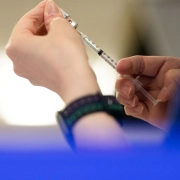Moderna Makes Headway with COVID-19 Booster, Flu Vaccine
Moderna Makes Headway with COVID-19 Booster, Flu Vaccine
BioSpace
Moderna is on the move and more active than ever. The company announced that its Omicron-containing COVID-19 booster candidate, mRNA-1273.214, demonstrated superior antibody response against Omicron in its Phase II/III study. The booster contains the original COVID-19 vaccine, Spikevax, as well as a vaccine targeting the Omicron variant.
In the study, the 50-microgram booster dose of the bivalent vaccine hit all pre-specified endpoints. These included superior neutralizing antibody response against the Omicron variant one month after dosing compared to the original Spikevax vaccine. The dose of the bivalent vaccine was generally well-tolerated, with side effects similar to what was seen with the initial Spikevax shots.
“We are thrilled to share the preliminary data analysis on mRNA-1273.214, which is the second demonstration of superiority of our bivalent booster platform against variants of concern and represents an innovation in the fight against Covid,” Stephane Bancel, Moderna’s CEO, said in a statement. “Looking at these data alongside the durability we saw with our first bivalent booster candidate, mRNA-1273.211, we anticipate more durable protection against variants of concern with mRNA-1273.214, making it our lead candidate for a Fall 2022 booster.”
They expect to submit the data to regulators soon with hopes of making the Omicron-containing bivalent booster available in late summer.
Moderna is not the only company focusing on modified vaccines against Omicron. As reported yesterday, the U.S. Food and Drug Administration’s Vaccines and Related Biological Products Advisory Committee recommended Novavax’s COVID-19 for emergency use authorization. The company launched a Phase III trial of a bivalent version of the vaccine against the Omicron strain on May 31. It contains both NVX-CoV2372, currently on the market in other countries and the one the adcom recommended. It also includes NVX-COV2515, which targets the Omicron variant.
BioNTech and Pfizer began manufacturing an Omicron-modified vaccine at the end of March. The companies have generally argued that the third and fourth booster doses of their original shot are effective against Omicron but began working on an Omicron-specific vaccine in case it was needed.
Moderna also announced it had dosed the first patients in a Phase III trial of its seasonal influenza vaccine candidate, mRNA-1010. The trial is expected to enroll about 6,000 adults in the Southern Hemisphere. It is designed to evaluate the safety and immunological non-inferiority of the mRNA flu shot, compared to a licensed seasonal flu vaccine in adults 18 years and older. There will be a 50/50 split between which one the participants receive.
The experimental shot uses mRNA that encodes for hemagglutinin (HA) glycoproteins of the four flu strains the World Health Organization recommended to prevent influenza this year, including influenza A/H1N1 A/H3N2, and influenza B/Yamagata- and B/Victoria-lineages. HA is used to create broad protection against influenza and is currently the primary target of the influenza vaccines. The company is also working on preparing a confirmatory efficacy study for the vaccine in the Northern Hemisphere as early as the 2022/2023 flu season if needed.
“We are pleased to begin this Phase III study of our seasonal influenza vaccine candidate, mRNA-1010, our fourth mRNA vaccine candidate to begin a pivotal Phase III study. mRNA-1010 is the first of several influenza vaccine candidates we are developing with the aim of iteratively improving traditional vaccines by inducing broad and robust immune responses,” Bancel said.
“We believe our mRNA platform, with the flexibility and speed of our manufacturing process, is well-positioned to address the significant unmet need in seasonal flu. Influenza vaccines are a key pillar in our respiratory vaccine strategy that includes the development of combination candidates targeting multiple viruses in a single vaccine, including influenza with SARS-CoV-2 and respiratory syncytial virus.”
In December 2021, Moderna announced positive interim Phase I data for mRNA-1010, which were satisfactory, but not dazzling. The results weren’t especially better than other available influenza vaccines. The company dosed the first participants in April in a Phase I/II study with two other seasonal flu vaccine candidates, mRNA-1020 and mRNA-1030.
Source: BioSpace






 Reuters
Reuters

 Reuters
Reuters

